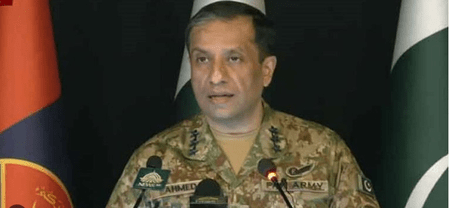New Delhi:
A senior Pakistani Army official has come under intense scrutiny following remarks perceived as a direct threat to India, using language eerily similar to that of UN-designated terrorist Hafiz Saeed. The official’s statement—“We will choke you”—has triggered a diplomatic stir and raised serious concerns in New Delhi about the alignment between elements of Pakistan’s military establishment and extremist rhetoric.
The remarks, broadcast on a Pakistani news channel earlier this week, did not mention Saeed by name, but the phrasing and tone were unmistakably reminiscent of threats made by the banned Lashkar-e-Taiba (LeT) founder. Saeed is widely held responsible for masterminding the 2008 Mumbai terror attacks and remains a contentious figure in India-Pakistan relations.
Indian Response and Diplomatic Implications
Indian diplomatic and defense circles reacted strongly, with sources from the Ministry of External Affairs (MEA) describing the statement as “provocative and deeply irresponsible.” The Indian government is reportedly preparing to lodge a formal protest and may escalate the matter through international forums, including the United Nations.
“This is not just a slip of the tongue. It reflects a dangerous mindset where extremist narratives are being echoed by state officials,” said a former Indian ambassador to Pakistan. “India must respond firmly but diplomatically to highlight the implications of such conduct.”
Hafiz Saeed’s Lingering Influence
Hafiz Saeed, despite being under house arrest, continues to exert ideological influence in Pakistan through his banned organization and its affiliates. His prior statements threatening India have often served as a rallying cry for extremist elements. The resurfacing of similar language by a government official raises questions about internal oversight and accountability within Pakistan’s security apparatus.
Security analysts believe the incident is indicative of a broader challenge. “There is a fine line between state-sponsored narratives and extremist posturing. Unfortunately, that line seems to be blurring,” noted Dr. Neeraj Malhotra, a strategic affairs expert at the Centre for South Asian Studies.
Global Repercussions Likely
The international community, especially key partners such as the United States and the European Union, may be briefed on the incident as part of India’s efforts to spotlight Pakistan’s perceived ambivalence on terrorism. Observers expect increased pressure on Islamabad to distance itself unequivocally from extremist ideologies.
“There’s growing fatigue internationally with double standards on terrorism,” said one Western diplomat. “Statements like these only validate the concerns long raised by India and others about Pakistan’s role.”
Islamabad Silent
As of now, there has been no official clarification or rebuttal from Pakistan’s Inter-Services Public Relations (ISPR), the army’s media wing. The silence has only added to the controversy, with many interpreting it as tacit approval or, at the very least, a lack of internal disciplinary mechanisms.
Conclusion
The controversy surrounding the Pakistani army official’s remarks has once again spotlighted the fragile nature of Indo-Pak relations. With New Delhi preparing for a strong diplomatic push and Islamabad yet to issue a response, the coming days may see heightened tensions—both on the geopolitical and rhetorical fronts.



